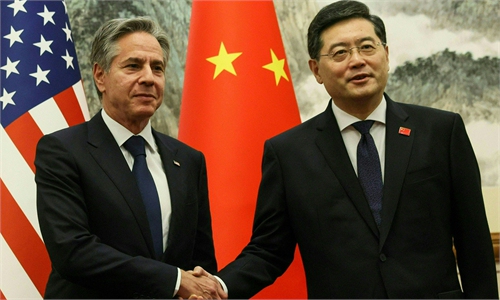
Illustration: Liu Xidan/Global Times
During US Secretary of State Antony Blinken's China visit, his meetings with China's senior diplomat Wang Yi and Foreign Minister Qin Gang appear to have resulted in some consensus. President Xi Jinping's meeting with him on Monday afternoon was prominently covered by the world media.
In my view, China has sent three major messages to the US through its actions and exchanges over the past six months:
First, China does not accept the US' containment strategy against China and is determined to thwart it. In particular, China does not accept the US' undermining of the one-China principle and has told the US in clear terms and with firm actions that its policy regarding the Taiwan Straits is dangerous. China likewise does not accept US hegemonic behavior in China's coastal waters, therefore it constantly increases the risk of the US' close surveillance on China. We also do not accept the US side's disruption of China's supply chain and economy and are engaged in a tit-for-tat struggle against US' decoupling strategy in various ways.
Second, China has demonstrated that it is not a country that can be easily crushed, and our strength continues to be exerted, as does our ability and determination to bear risks. If a military crisis were to occur today, the US clearly lacks the confidence to win quickly in China's offshore waters or to overwhelm China through attrition, and it is worried that it would fail and lose face. Given that a new election is approaching, direct hostility toward China would be an unbearable burden for the Biden administration.
On the issue of supply chains, the US has gone too far, stimulating the accelerated development of China's chip technology on the one hand and posing a serious threat to the long-term interests of US companies on the other. Fears of decoupling to the detriment of the US are growing, so speculations are circulating that the US is allowing South Korean and Taiwan island's semiconductor manufacturers to keep their operations on the Chinese mainland. Such reports appear to reflect the hesitation and entanglement of the US side. Economically, China's recovery was less than ideal as we entered the second quarter, but the US' performance has been worse. China still has many tools at its disposal to revive its economy, and a stalemate with China would do more harm than good to the Biden administration.
Third, China is reasonable. On the one hand, we stand firm on our principles; on the other hand, we adopt a clear defensive policy toward the US. We firmly reject unequal high-level military dialogues but open the door to other dialogues when it is time to do so, and our real attitude is to co-exist peacefully with the US for mutual benefit and cooperation. A proper adjustment of US' policy toward China and the maintenance of a normal relationship with China, rather than making China an "enemy" or "ubiquitous adversary," will obviously do more good than harm to the US, especially to those in power who are seeking re-election.
What the US fears the most is that China will continue to develop, but interrupting China's development process with nasty geopolitical maneuvers cannot succeed but implies huge political risks for US policymakers. The Biden administration's attempts over the past two years to deal with China along the lines of dealing with the Soviet Union are not going to go down well, and they should already have been in a state of confusion.
It can be seen from US media's reports that Blinken's visit to China was actively initiated and facilitated by Washington. While some US political elites have accused China of "ghosting" the US and have argued that the US should not encourage it, the Biden administration clearly senses fatigue and unease about the risks from its policy toward China.
I do not dare to say whether the "candid, in-depth and constructive talks at length" between the top Chinese and US diplomats will have any real effect in stopping the further deterioration of relations or even provide some rational impetus for a certain degree of rebound in relations. Engaging in a great power Cold War-style confrontation is really driving backward in history, and no one would really welcome such a reversal.
The US is struggling to engage in decoupling both domestically and internationally, and to provoke a war would be an even higher political risk for it. It is necessary that both China and the US go with the trend after diplomatic meetings between the two countries, make their own efforts to ease bilateral relations and do not see the new China-US cold war as a kind of destiny.
The author is a commentator with the Global Times. opinion@globaltimes.com.cn


